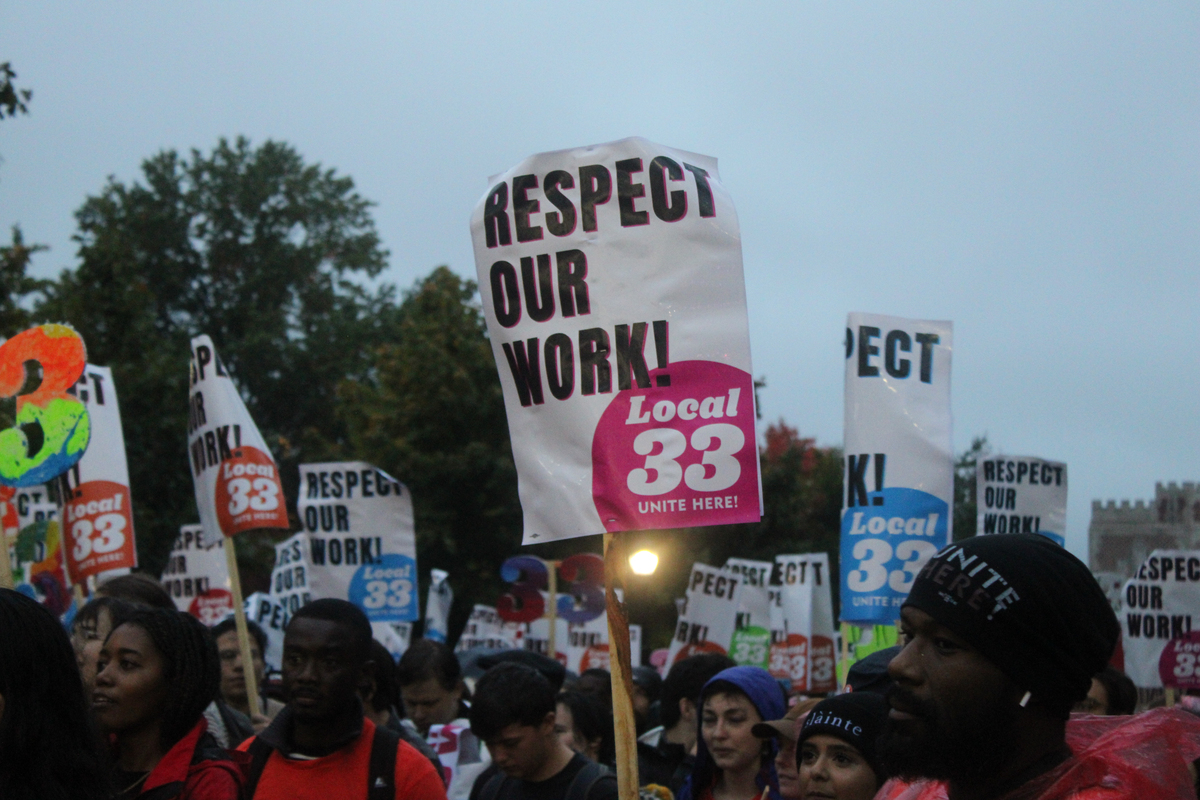Yale and Local 33 agree on union election date and voter eligibility
The National Labor Relations Board process will be held on Nov. 30 and Dec. 1. Most graduate and professional school workers will vote in-person or through absentee ballots to decide whether to form a collective bargaining unit.

Megan Vaz, Contributing Photographer
After weeks of negotiation between Yale and Local 33, the National Labor Relations Board has set official dates, terms and eligibility rules for the graduate and professional worker union election.
The election — the product of decades of Local 33 organizing on campus, including the collection of thousands of union authorization signatures over the past year — will occur on Nov. 30 and Dec. 1. Eligible voters, as determined by the NLRB, will decide through a simple majority vote whether or not to form a collective bargaining unit with University recognition.
“I’m glad that the Yale administration is listening to the will of graduate workers and allowing us to proceed with our election with no delays,” Javier Porras Madero GRD ’26 wrote in a Local 33 press release. “I can’t wait to cast my vote to win a union for myself and my coworkers!”
University spokesperson Karen Peart affirmed to the News that the University is satisfied with the settled election terms. Peart also wrote that University Provost Scott Strobel “has encouraged graduate and professional school students to take an active role in weighing the issues involved in unionization,” including in a previous statement shared with the community.
Just three weeks ago, the union filed an official petition with the signed authorization of three-quarters of eligible voters. Four days later, the University announced it would hold a recognized election for the first time, as federal labor law requires employers to respond to petitions within two weeks.
After a few short weeks of election term negotiations, which included hearings over voter eligibility and an agreement to accept both manual and mail-in ballots, the University and Local 33 will now prepare for their first ever union election.
Although Local 33 has spent the past three decades organizing for a union, the finalization of election terms this week marks the closest the group has ever come to official unionization.
In 2016, Local 33 filed NLRB petitions after eight GSAS departments individually held elections and voted in favor of unionization, but the petitions were ultimately withdrawn in 2018 due to concerns over restrictive labor policies under the Trump-appointed board. Before the petitions were dropped, Yale and Local 33 were engaged in court battles over the validity of elections held in individual departments.
“Yale University has historically opposed graduate student unionization,” said organizer Camila Marcone GRD ’27 in the Local 33 press release. “It’s very refreshing to see the University turn away from its union busting ways of the past. As Congresswoman Rosa DeLauro has said about other unions on campus, ‘a great university and a strong union can stand side by side.’ Graduate workers at Yale are ready to work productively with the Yale administration to negotiate a great contract after we win our election.”
The 4,000 workers eligible to vote, according to the NLRB, comprise most Graduate School of Arts and Science students and students at all professional schools who are employed as teaching fellows, writing fellows, project assistants or research assistants, including those receiving a University Fellowship.
Additionally, teaching fellows from the School of Management, School of Music and School of Medicine who work as section leaders, teaching assistants or lab leaders may cast ballots. Voters must have been employed in unit positions this semester or be current GSAS doctoral students who were employed in such positions during the Spring 2022 or Fall 2021 semesters.
Bargaining units, as set in the National Labor Relations Act, must include employees who “share a community of interest” with regards to wages, hours and working conditions, sometimes entailing the exclusion of some working under the same employer. Thus, the terms for the upcoming election leave out some graduate and professional school employees from voting.
These students include Jackson Institute course assistants, School of Drama class assistants and University Fellow research assistants who are first years or doctoral students at the School of the Environment.
Meanwhile, first-year University Fellow research assistants enrolled in the GSAS’s Combined Program in Biology and Biomedical Sciences or in non-computer science programs at the School of Engineering and Applied Science will cast “challenged ballots.”
These ballots may or may not be counted due to ambiguities in these voters’ employment status, and such issues will “be resolved, if necessary, following the election,” according to the NLRB.
Nonetheless, Local 33 claims that many non-voting graduate and professional school employees will have the opportunity to join and support the collective bargaining unit during and after contract negotiations if students vote in favor of the union. Many undergraduate students are also lending their support to Local 33’s pre-election organizing, with the undergraduate group Students Unite Now circulating a petition calling for the University to remain neutral in the election.
Leading up to the election, issues on voters’ minds include stipend amounts, grievance procedures, health coverage, protections for international students and work safety conditions.
“I love the work I do at Yale and am proud to be contributing to the educational and research mission of the University,” said Buğra Şahin GRD ’26 in the press release. “But I also need to know my pay will keep up with the rising cost of living in New Haven. I found my savings totally wiped out by the cost of dental surgery that I desperately needed. I don’t think graduate workers should have to choose between paying our bills and going to the dentist.”
Designated polling places will be organized by department and school affiliation, with voting rooms located across the Humanities Quadrangle, the Yale Science Building, the Brady Memorial Laboratory and the West Campus Conference Center.







